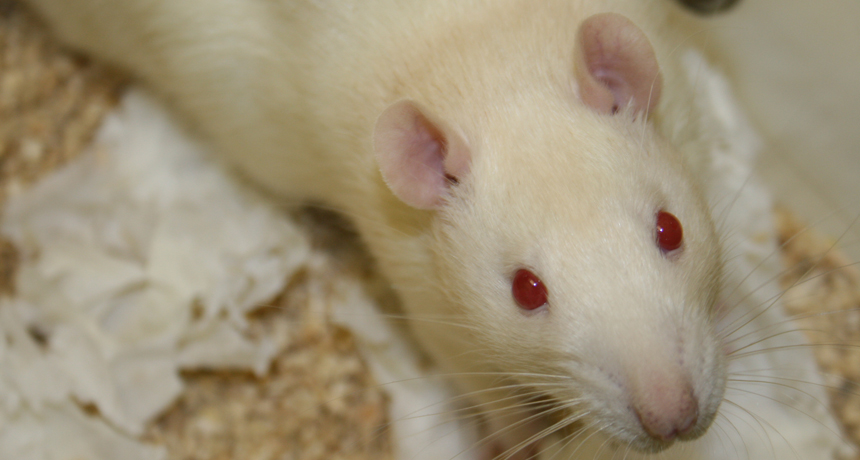For rats, a break from stress isn’t worth the relief

This rat might look like he needs a weekend, but a few days off might make him more anxious in the face of stress.
Jean-Etienne Minh-Duy Poirrier/Wikimedia Commons
Even when we love our jobs, we all look forward to some time away. During the week, as stress builds up and deadlines accumulate, Friday looks better and better. Then, with a sigh of relief, the weekend arrives. But come Monday, it seems like the whole weight of responsibility just comes crashing down again.
It’s not just you. Rats feel it, too. Rats given a two-day break from a stressful procedure show more signs of strain on “Monday” than rats who never got the weekend, researchers report July 11 in PLOS ONE. The results show that in some cases, an unpredictable getaway can cause more stress than just working through the pressure.
Wei Zang, J. Amiel Rosenkranz and colleagues at the Rosalind Franklin University of School of Medicine and Science in Chicago wanted to understand how changes to a stressful situation alter an animal’s response to stress. Normally, when rats are exposed over and over to a stress such as a restraint (in which a rat is placed in a small tube where it can’t turn around or get out), they begin to get used to the stress. Over a few days, rats stop avoiding the tube and stay calmly in the restraint without struggling, until they are set free. Hormones like corticosterone — which spikes in response to stress — go down. This phenomenon is called habituation.
Zhang and colleagues wanted to see what happens when this pattern of stress is interrupted. They restrained rats for 20 minutes each for five days. By day five, the animals were hanging out comfortably in the tubes. Then, the scientists introduced an interruption: They gave half of the rats two days off, a science-induced weekend. The scientists continued to restrain the other group of rats daily.
When the first group came back to restraint from their two-day weekend, the rats showed more signs of stress than animals that didn’t get a break. The weekender rats had higher levels of corticosterone, struggled in the tube and pooped significantly more (a stress response in rats) than their constantly stressed counterparts. Their habituation to the restraint stress was reduced; the rats couldn’t handle the pressure as well as they had before their time off.
Then the scientists examined how getting a weekend off affected anxiety using a type of plus-shaped maze. The maze is high off the ground, and two of the arms have high walls, creating small dark spaces where rats can feel safe. The other two arms are open platforms, a scary proposition for a rat. High anxiety rats stay where it’s safe, while adventuresome rats step boldly into the open arms.
Rats that experienced restraint showed more anxiety than rats that had never had the stressor. But the group of rats that got the weekend off showed even more anxiety, spending very little time in the open arms compared to the other rat groups. The time off from the stressor resulted in less habituation, and in the end, in more anxiety.
Habituation to a tough situation is actually a very important coping mechanism. “It allows an individual to spend less energy on responding to stressors that are predictable,” says Seema Bhatnagar, a neurobiologist at the University of Pennsylvania School of Medicine in Philadelphia. Without habituation, animals will continue to stress out, and stress can have long-term consequences including mental illness and a shortened lifespan.
While this tells scientists a lot about how animals get used to stress, it doesn’t mean anyone should give up their weekend to avoid a Monday panic. After all, the rats in the study didn’t know they would have to face the restraint tube again, or that they were getting days off from the tube in the first place. “These specific results make sense because getting used to stress is partly due to the predictability of the experience,” Bhatnagar explains. “If suddenly the stress stops and then restarts, it becomes less predictable and the habituation process in a sense has to restart.”
Humans, who know full well on Friday that they will be facing work again on Monday, probably won’t have this problem at the beginning of every work week. “Working stressful five-day weeks for a month may have worse net effects on overall psychological well-being than working every single day of that month,” Rosenkranz says. “However, given enough cycles of this pattern, we believe habituation would eventually win out.” So if the experiments had continued, rats that got weekends would probably end up habituating anyway.
“In the larger sense, one would predict that having days off from stress would be beneficial,” Bhatnagar says. But the findings could be important for managing some types of stress. Repeated stress over shorter periods of time is associated with risk for depression and post-traumatic stress disorder. Learning more about the effects of brief stress, continuous or with unpredictable breaks, could help scientists understand the factors that underlie these mental disorders.







